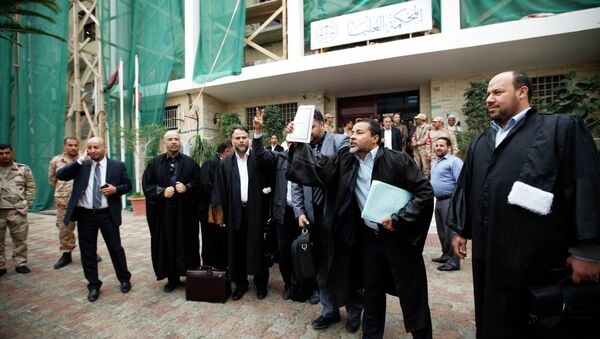MOSCOW, November 6 (RIA Novosti) — The Libyan Supreme Court invalidated the country’s internationally-recognized parliament on Thursday, the Libyan News Agency has reported.
The decision came after Islamist lawmakers opposed to the new body asked the court to rule on the constitutionality of the parliament.
As the Libya Herald explained, the proceedings of the General National Congress’s February Committee, which resulted in the creation of its House of Representatives, were declared unconstitutional; therefore, this summer’s elections, held in June, were also said to be unconstitutional.
The decision cannot be appealed, according to Libyan law.
Analyzing the decision, news media including Reuters and Al Jazeera have said that Islamist militia control over the Tripoli-based court, together with reported threats against judges, doubtlessly played a role in their decision. The Financial Times has said that since seizing Tripoli in August, militias have worked to systematically expel civil society activists from the country, while purging government institutions thought loyal to the government of Prime Minister Abdullah al-Thani.
Al-Thani’s government, including the House of Representatives elected in June, is now holed up in the remote eastern city of Tobruk, with little control over the rest of the country despite his government’s international recognition. Both Tripoli and Benghazi, the country’s second-largest city, are under the control of Islamist militias.
Islamist lawmakers in Tripoli had made the request for a ruling by the Supreme Court, after earlier challenging the legitimacy of al-Thani’s government, which did not come to Tripoli for a swearing-in ceremony after being chosen in elections in June. Tripoli has been under the control of Islamist militias from Misrata since August.
Recently, extremist militants from the Tuareg minority, allied with Islamist groups to the north, have also overrun one of the country’s main oil fields in the country’s south. The El Sharara oilfield, jointly managed by the Libyan government and the Spanish energy company Repsol, has the capacity to produce up to 340,000 barrels of oil per day.
Libya has suffered from lawlessness and civil war since a 2011 NATO airstrike-supported revolt against Muammar Gaddafi ended in the leader’s gruesome murder.
Late last month, Amnesty International released a statement noting that in Libya “the rule of the gun has taken hold,” with “armed groups and militias…running amok, launching indiscriminate attacks in civilian areas and committing widespread abuses, including war crimes, with complete impunity.” Amnesty placed the blame on Libya Dawn, a coalition of Islamist groups from Misrata and Tripoli, as well as the Zintan-Warshafana coalition, an anti-Islamist group from the Zintan and Warshafana areas. The resource Libya Body Count has estimated that over 1,100 people have been killed in the country this year alone.
Last month, the United States, France, Britain, Italy and Germany said that they would consider introducing sanctions against Libya in the face of growing violence.


